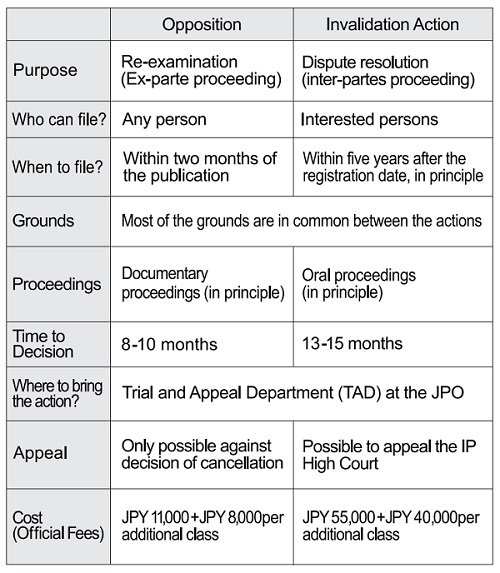ブログ
Should I Choose "Opposition" or "Invalidation Action"? [ Japan Trademark & Design Update]
2021.07.31
Should I Choose "Opposition" or "Invalidation Action"?[ Japan Trademark & Design Update]
https://www.tmi.gr.jp/uploads/2021/07/26/jptu_issue18.pdf#page=5
Introduction
In Japan, there are two ways to challenge the validity of trademark registrations based on absolute or relative grounds after the trademark is registered – “Oppositions” or “Invalidation Actions.” Both procedures have several elements in common, but also feature some important differences. Which one is it best to choose?
Opposition or Invalidation Action ?
Japan has adopted a “post-grant opposition” system since 1997 to comply with the Madrid Protocol which requires member states to issue First Office Actions within 18 months. At that time, it took 3 to 5 years for trademark registrations to issue and desire to speed up such delayed examination process was an important issue behind the decision to join the Madrid Protocol. As a result, two similar procedures, Oppositions and Invalidation Actions, are co-existing.

The above chart shows the comparison of these two similar procedures.
Although both procedures are similar, in an Invalidation Action, the TAB tends to examine the case more thoroughly as opposed to in an Oppositions. Moreover, even if the opponent is dissatisfied with the dismissal in an Opposition procedure, it is still possible for it to file an Invalidation Action based on the same grounds.
Oppositions rarely succeed
Based on the statistical information published by the JPO, the average success rate of Oppositions in the past 10 years is 13.9 %, whereas that of Invalidation Actions is 36.2%.

This clearly shows that the Japanese Opposition system does not appear to be working effectively as a re-examination system for registered trademarks. It is said that the JPO’s TAD is reluctant to overturn decisions made by examiners in the same administrative agency by way of an ex-parte proceeding. This may be true because the JPO receives Oppositions after the registration is granted under a “post-grant opposition” system.
Conclusion
It is clear that challenging the validity of trademark registration by filing an Invalidation Action will have a better chance of success in Japan, considering the low success rate in Opposition proceedings. Thus, we recommend filing an Invalidation Action, especially when you are able to collect more evidence to challenge the validity. Alternatively, in order to avoid spending unnecessary time and money by choosing an Opposition or Invalidation Action, it is also advisable to use “information provision system” under which anyone can submit reasons and evidence for the rejection of a pending trademark application during the examination stage.
Member
PROFILE

